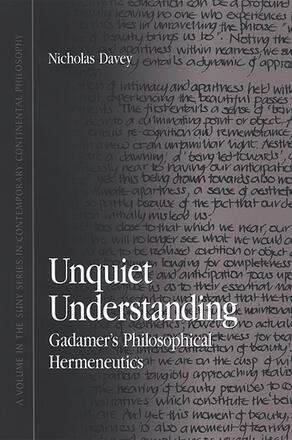
Unquiet Understanding
Gadamer's Philosophical Hermeneutics
Alternative formats available from:
Argues that Gadamer’s philosophical hermeneutics merits a radical reappraisal.
Description
In Unquiet Understanding, Nicholas Davey reappropriates the radical content of Gadamer's philosophical hermeneutics to reveal that it offers a powerful critique of Nietzsche's philosophy of language, nihilism, and post-structuralist deconstructions of meaning. By critically engaging with the practical and ethical implications of philosophical hermeneutics, Davey asserts that the importance of philosophical hermeneutics resides in a formidable double claim that strikes at the heart of both traditional philosophy and deconstruction. He shows that to seek control over the fluid nature of linguistic meaning with rigid conceptual regimes or to despair of such fluidity because it frustrates hope for stable meaning is to succumb to nihilism. Both are indicative of a failure to appreciate that understanding depends upon the vital instability of the "word." This innovative book demonstrates that Gadamer's thought merits a radical reappraisal and that it is more provocative than commonly supposed.
Nicholas Davey is Professor of Philosophy at the University of Dundee, Scotland.
Reviews
"…[an] excellent book … Davey's exposure of the subversive, provocative, and conflictive character of hermeneutics remains the most innovative aspect of his text." — Symposium
"In Nick Davey, Gadamer's legacy finds a powerful advocate, who is similarly ready to distance himself from his subject, and his writings, in order the better to reconstruct their conceptual possibility, and thereby to provide the stronger account of what is philosophically distinctive in Gadamer's reinvention of hermeneutics … [a] fine book…" — British Journal of Aesthetics
"This is the most enlightening introduction available to Gadamer's philosophical hermeneutics. It redefines transcendence and translation in hermeneutical terms, but it goes substantially beyond this to offer an introduction to many other topics in philosophical hermeneutics." — Richard E. Palmer, coeditor of Dialogue and Deconstruction: The Gadamer-Derrida Encounter
"Elegantly written, this book provides an engaging, original, and challenging reading of Gadamer's hermeneutics. Davey offers an insightful clarification of the nature and specific contribution of hermeneutics as well as a revealing description of the wantonness of understanding." — Jean Grondin, author of Sources of Hermeneutics